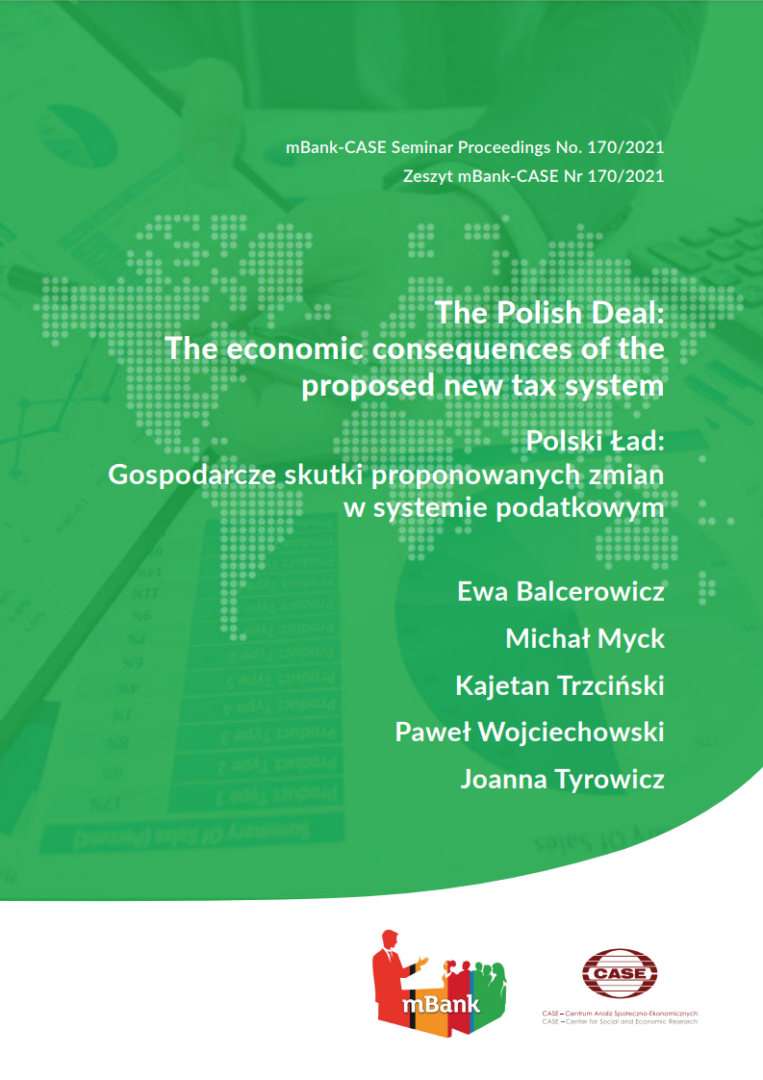 Homepage CASE
Homepage CASE
Selected values

170th mBank-CASE Seminar Proceedings: The Polish Deal: The economic consequences of the proposed new tax system
-

Ewa Balcerowicz
Chairwoman of CASE Supervisory Council (July 2008-present) and mBank-CASE Seminars Project Manager
Articles from this author:
-
Summary of the 182nd mBank-CASE Seminar
The seminar discussed the challenges and opportunities related to the integration of Ukrainian agriculture into the European market, a process that became particularly important after Ukraine started its EU accession process. Both Polish and Ukrainian agriculture share common traits, such as high food self-sufficiency levels and significant economic importance. However, there are notable differences—Ukraine has far larger agricultural resources, though its agricultural sector is underfunded, while Poland has made considerable progress due to EU support. A key concern is the risk of excessive competition between countries, which could harm European farmers. Experts emphasized that the development of Ukrainian agriculture should be based on synergy, and the accession process will require long-term negotiations and transitional periods. Differences in export structures were also discussed—Ukraine focuses on agricultural raw materials like grains and oils, while Polish exports are more diversified. The Common Agricultural Policy (CAP) will need to be reformed to support the agricultural sectors of both countries in a sustainable way, considering new challenges and promoting environmentally friendly practices.
-
177th mBank-CASE Seminar Proceedings: The Just Energy Transition from the Perspective of Cities and Regions – the experience of Poland and other European Union countries
Climate change is a global problem - it requires the cooperation of countries all over the world and the implementation of sustainable development concepts. In mBank-CASE Seminar Proceedings no. 177 authors describe the ways selected Polish regions tackled the challenges of transition towards sustainable energy. Agnieszka Kulesa, Vice-President of CASE Management Board, focuses on Lusatia, Upper Nitra and Greater Poland and the way these regions handled the transition, highlighting the role of lignite mining. Aleksandra Gawlikowska-Fyk, Energy Forum expert and director of the Electricity comments on Agnieszka’s findings. Next chapters focus on the way two cities in Poland managed to make their way through an energy transition: Konin - described by Piotr Korytkowski, Its President, and Wałbrzych - by Andrzej Kosiór, Head of the Strategic Management Office. Table of contents Ewa Balcerowicz - Introduction p. 5-7 Agnieszka Kulesa - The just energy transition in Lusatia (Germany), Upper Nitra (Slovakia) and Greater Poland (Poland) – conclusions and recommendations p. 8-23 Aleksandra Gawlikowska-Fyk - Just Energy Transition in Poland: where we stand p. 24-27 Piotr Korytkowski - Energy transition of Konin and the Konin region p. 25-34 Andrzej Kosiór - Lower Silesia’s energy transition – the experience of Wałbrzych p. 34-42
-
My CASE
We are pleased to present you the book "MY CASE" published on the occasion of our 30th anniversary. The book is a collection of texts authored by individuals who have been involved with CASE throughout its 30-year history or for shorter periods of time, but for whom the Foundation has played an important role in their personal development. They are economists-researchers, experts, staff, founders, Management Board members and Supervisory Council members. This is why the title "MY CASE" perfectly captures the nature of the book. In their memories, written in Polish or English, the authors describe CASE as the institution and how they remember it throughout its 30 years of existence. The book, which was edited by Ewa Balcerowicz, consists of 9 chapters in which the history of CASE is presented chronologically. Thanks to that along with the authors’ memories we can learn about how CASE has changed since 1991 when it was founded.
-
Summary of the 182nd mBank-CASE Seminar
Related publications
Thanks for joining us!
You're now part of a community that values [your newsletter's focus]. Get ready to stay informed, inspired, and engaged with our carefully curated content.
